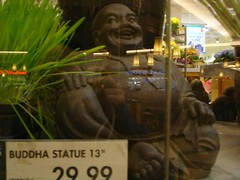 hello friends, and thanks for visiting this month’s buddhist carnival!
hello friends, and thanks for visiting this month’s buddhist carnival!
before we start, i want to say:
happy father’s day!
and i want to tell you a bit about my father, who passed away 12 years ago. it was my father who awakened my interest in buddhism. buddhism was a philosophy that suited my father well. when i think of him, the first emotional images that arise are of a calm but passionate man, who was intimately aware of the nature of illusion, and who was infinitely compassionate yet unentangled with other people’s suffering. he also had an all-encompassing sense of humour that often seemed to hold the whole world’s vast absurdity in his loving, warm hands. yes, he talked about buddhism here and there, but more than that, he was an example of it. i don’t think i ever heard him use a phrase like “living in the moment” but even in his darkest days (and there were many!) there was always a sense of presence about him; perhaps he often did not live in the moment but he was frequently aware of it, and it showed.
it is interesting that this immediate recall i have of him is always much louder and more intense than the other stuff: like many “gurus” (a very charismatic man, he was a strong influence on those around him, most of them fellow artists), he was fallible in countless ways. he was manipulative and had that impossible sense of entitlement so typical of the european aristocracy that had survived the upheavals of history anything but intact. this man was also addicted to just about anything that caught his fancy, and struggling, for his life many times, with bipolar disorder.
and yet, as i paint this all-round picture, these all-too-apparent shortcomings serve nothing but to enrich the image of my father that i carry in my heart.
i am deeply grateful that i can say “yes” to all that my father was. that, too, comes from him: this fierce doctrine of inclusion and acceptance.
thank you, father. or let me talk to him directly, in german:
pappi, danke fuer all die geschenke, mit denen du mich ueberhaeuft hast. danke, dass du mir den buddha geschenkt has.
***
and now: let’s move on to the carnival:
the essence of the sutra is a poem
i really like opening this carnival with a poem. in this post, the sutra on knowing the better way to live alone – thich nhat hanh we hear
the essence of the sutra is a poem. the buddha wrote poems, but the poems of the buddha were more designed to show us how to practice. the gatha which talks about the art of living alone is called the bhaddekaratta gatha, bhaddekaratta means “the best way to live alone.” many people have mistranslated this title: one master translated it as “practicing for one night.” there’s also another master who translated this title as “being present.” the correct translation is to say “the better way to practice living alone.” this poem says:
do not pursue the past.
do not lose yourself in the future.
the past no longer is.
the future has not yet come.
looking deeply at life as it is
in the very here and now,
the practitioner dwells
in stability and freedom.all of the essence of the buddha’s teachings lies in these words.
loss
next, a post on loss by our friend chris, the martial artist, who has been a welcome guest here on this carnival quite a few times already. he talks about a topic that i have been thinking about lately, so i was happy to hear more about it. it is called investing in loss, investing in ego
the hero’s journey starts with self-reinforcement, passes through acceptance and internal quietude, to arrive at listening, learning and perhaps, ultimately, transcendence. this is the common path of spirituality and martial arts. to win, one must first be sincerely willing to lose more than just their footing.
as often, i am presenting this carnival in two parts. i find it contradictory to praise the simplicity of buddhism and then at the same time flood you with even more words than i usually do.
the second part will come out in the next few days, some time before june 20.
in the meantime, if you have an article about buddhism you would like to see featured here, please use this submission form.
and don’t forget
do not pursue the past.
do not lose yourself in the future.
in gassho,
isabella
(image by T a k)
